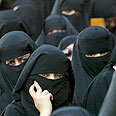
Women in the Middle East have broken down some educational barriers, secured a bigger economic role and won other rights in the past five years but still suffer great inequalities, a study showed.
Fifteen of 18 countries in the poll recorded gains in women's rights in the period, notably in Kuwait, Algeria and Jordan, United States-based group Freedom House said.
Only in Yemen, Iraq and the Palestinian areas – as a result of either internal conflict or what the study described as rising religious extremism – did women's rights decline over the past five years, the study "Women's Rights in the Middle East and North Africa: Progress and Resistance" said.
Among the milestones, it cited Kuwait's 2005 decision to give women the right to vote and run for parliament and the same year Algeria banned proxy marriages and recognized the parental authority of custodial mothers.
It said women's literacy rates continued to rise in the region and, in some countries, women were now more likely than men to attend university.
"There are more women entrepreneurs, more women doctors, more women PhDs and more women in universities, than ever before," said Freedom House executive director Jennifer Windsor in a statement commenting on the study.
Windsor noted that women's career path in the region was complicated still by their legal status. For example, in Saudi Arabia women were allowed to earn law degrees but not to appear in court on behalf of their clients, she said.
"These same women are subject to abuse at home, lack child guardianship rights, and are legally compelled to obey their husbands," she said of the situation in Saudi Arabia.
Violence against women and impunity in spousal abuse remained widespread, the study said. No country covered explicitly prohibited spousal rape and only Tunisia and Jordan offer specific protections against domestic violence, it said.
"When courts are incapable of upholding basic legal rights in the face of political and societal pressures, those guilty of spousal abuse, gender-based discrimination, or even murder, often walk free," said Sanja Kelly, who directed the study.















